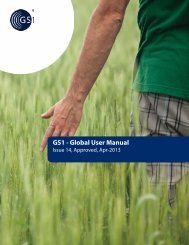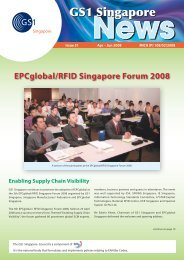13TH ECR ASIA PACIFIC CONFERENCE ... - GS1 Singapore
13TH ECR ASIA PACIFIC CONFERENCE ... - GS1 Singapore
13TH ECR ASIA PACIFIC CONFERENCE ... - GS1 Singapore
Create successful ePaper yourself
Turn your PDF publications into a flip-book with our unique Google optimized e-Paper software.
FDA proposes Unique Device<br />
Identification (UDI) System for<br />
Medical Devices<br />
On 3 rd July 2012, in response to requirements in legislation<br />
that passed Congress with broad bipartisan support, the U.S.<br />
Food and Drug Administration proposed that most medical<br />
devices distributed in the United States carry a unique device<br />
identifier, or UDI.<br />
A UDI system has the potential to improve the quality of<br />
information in medical device adverse events reports, which<br />
will help the FDA identify product problems more quickly,<br />
better target recalls, and improve patient safety. The FDA<br />
has worked closely with industry, the clinical community and<br />
patient and consumer groups and conducted four pilot<br />
studies in the development of this proposed rule. The FDA is<br />
seeking comment on the proposal for 120 days.<br />
"The safety of medical devices is a top priority for the FDA,<br />
Congress, industry, and patients," said FDA Commissioner<br />
Margaret A. Hamburg, M.D. "The unique identification system<br />
will enhance the flow of information about medical devices,<br />
especially adverse events and, as a result, will advance our<br />
ability to improve patient safety."<br />
With certain exceptions, under the proposed rule, a UDI<br />
would include:<br />
<br />
<br />
a device identifier, which is a unique numeric or<br />
alphanumeric code specific to a device model; and<br />
a production identifier, which includes the current<br />
production information for a device.<br />
The FDA is proposing a risk-based, phased-in approach to<br />
implementation, focusing on the highest-risk medical devices<br />
first and exempting low-risk devices from some or all of the<br />
requirements. The FDA is proposing to exempt over-thecounter<br />
devices sold at retail; these devices generally have<br />
UPC codes in place.<br />
A UDI is a unique numeric or alphanumeric code that acts as<br />
a key to certain basic identifying information about a device,<br />
such as the name of the manufacturer and the type of device,<br />
and may represent certain other information about the<br />
device, such as its expiration date and batch or lot number.<br />
This information will be contained in a publicly available UDI<br />
database, and no identifying patient information will be stored<br />
in this device information center.<br />
The proposed rule reflects the considerable input the FDA<br />
received from the medical device industry, the clinical<br />
community, patients and consumers, and industry experts.<br />
To minimize industry costs and expedite implementation, the<br />
proposed rule builds upon current standards and systems<br />
already in use by some companies.<br />
Example of what a universal device identifier (UDI) would look<br />
like on a medical device label. The label contains information<br />
about the product name, its expiration date, reference and lot<br />
numbers, manufacturer information, bar code, details about the<br />
item, and an illustration of the item.<br />
A UDI system can provide multiple benefits, including:<br />
<br />
Allow more accurate reporting, reviewing and analyzing<br />
of adverse event reports so that problem devices can be<br />
identified and corrected more quickly.<br />
Reduce medical errors by enabling health care<br />
professionals and others to more rapidly and precisely<br />
identify a device and obtain important information<br />
concerning the characteristics of the device.<br />
<br />
Provide a consistent way to enter information about<br />
devices in electronic health records and clinical<br />
information systems.<br />
Provide a standardized identifier that will allow<br />
manufacturers, distributors and healthcare facilities to<br />
more effectively manage medical device recalls.<br />
<br />
Provide a foundation for a global, secure distribution<br />
chain, helping to address counterfeiting and diversion<br />
and prepare for medical emergencies.<br />
__________________________________________________<br />
The FDA, an agency within the U.S. Department of Health and<br />
Human Services, protects the public health by assuring the safety,<br />
effectiveness, and security of human and veterinary drugs,<br />
vaccines and other biological products for human use, and<br />
medical devices. The agency also is responsible for the safety<br />
and security of our nation’s food supply, cosmetics, dietary<br />
supplements, products that give off electronic radiation, and for<br />
regulating tobacco products.<br />
<strong>GS1</strong> <strong>Singapore</strong> News - July 2012 <strong>GS1</strong> <strong>Singapore</strong> Limited, 2985 Jalan Bukit Merah <strong>Singapore</strong> 159457 page 9/10








